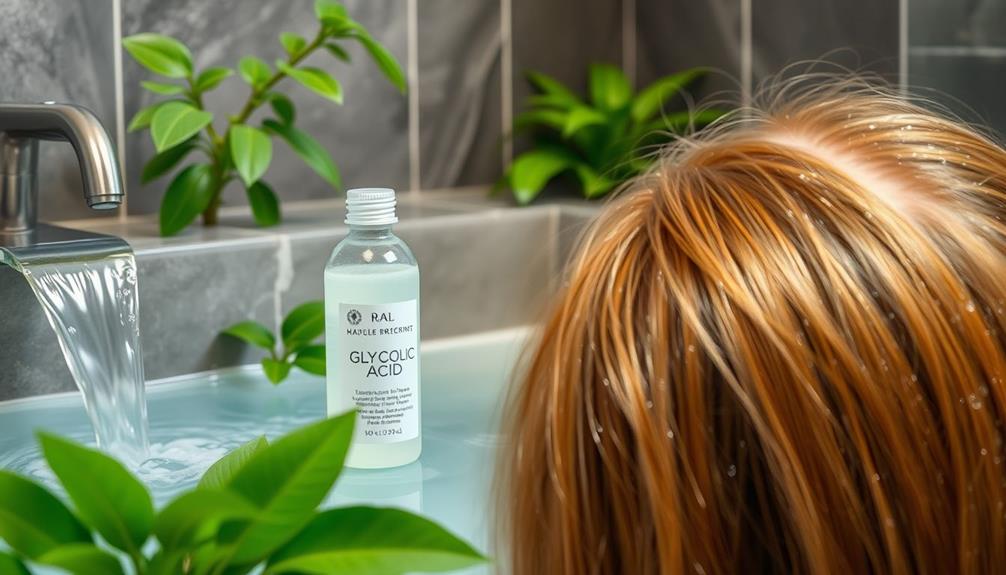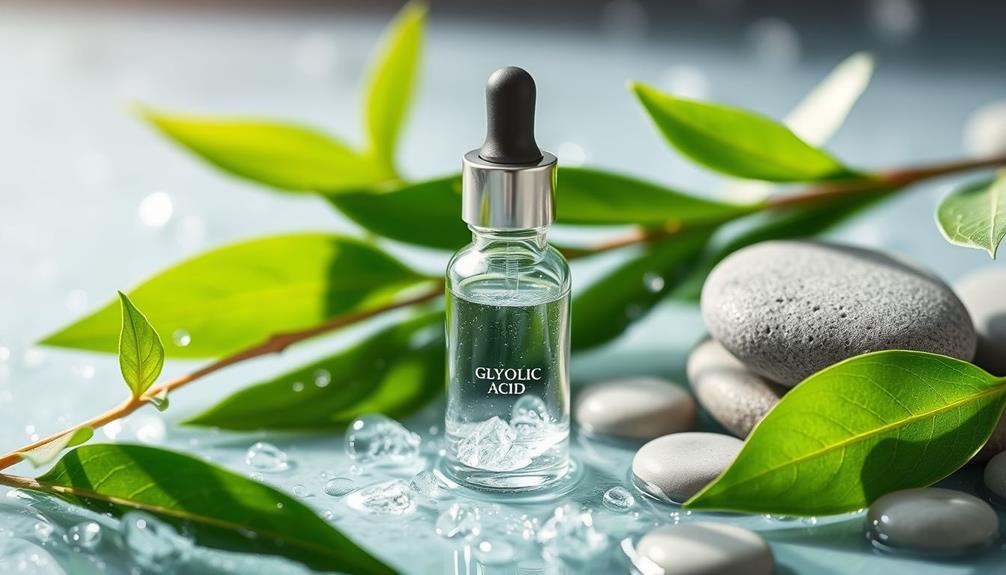Glycolic acid can significantly improve the health of your scalp by exfoliating and hydrating the skin deeply while balancing pH levels. It breaks down the bonds between dead skin cells, effectively eliminating buildup and preventing clogged pores, which can reduce dandruff and irritation. This alpha-hydroxy acid also works as a moisture magnet, ensuring your scalp remains hydrated and comfortable. By encouraging cellular turnover and enhancing blood circulation, it revitalizes hair follicles for improved growth. If you want to learn more about how to include glycolic acid in your routine, explore its uses and benefits further.
Key Takeaways
- Glycolic acid exfoliates the scalp by breaking down dead skin cell bonds, reducing buildup and preventing clogged pores.
- It enhances moisture retention, keeping the scalp hydrated and alleviating dryness and irritation.
- The acid regulates scalp pH levels, which helps prevent irritation and promotes a healthy environment for hair follicles.
- Glycolic acid helps relieve symptoms of dandruff and seborrheic dermatitis, maintaining comfort and reducing flakiness on the scalp.
Understanding Glycolic Acid
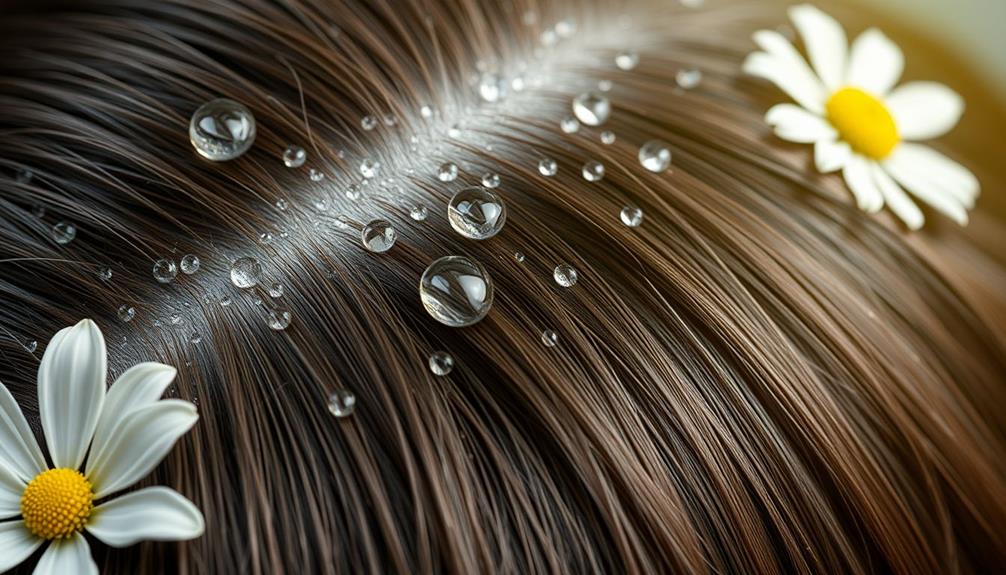
Glycolic acid, a mild alpha-hydroxy acid derived from sugar cane, penetrates deeply into your scalp, making it an effective solution for improving scalp health. Its small molecular size allows glycolic acid to dissolve the bonds between dead skin cells, enabling you to exfoliate effectively. This powerful exfoliation promotes a smoother scalp surface, helping you achieve that healthy look you desire.
Additionally, incorporating essential oils such as essential oils for hair growth can further enhance the health of your scalp and hair.
In addition to its exfoliating properties, glycolic acid acts as a moisture magnet, enhancing hydration levels in your scalp. This increased moisture is vital for maintaining a balanced scalp environment and combating dryness. Regular use of glycolic acid can also help alleviate symptoms associated with seborrheic dermatitis, reducing flakiness and irritation.
To get the best results, look for hair and skincare products featuring glycolic acid, typically in concentrations ranging from 5% to 20%. By incorporating this potent ingredient into your routine, you'll support your scalp health, ensuring it remains nourished and revitalized.
Benefits for Scalp Health

Glycolic acid offers several key benefits for your scalp health.
It effectively exfoliates, removing dead skin and buildup while enhancing moisture retention to combat dryness.
Additionally, it can improve overall scalp health by promoting a balanced environment, which is essential for healthy hair growth.
Plus, it helps relieve dandruff and irritation, making your scalp feel refreshed and balanced.
Essential oils for scalp care can also complement these benefits by providing soothing and nourishing properties.
Exfoliation and Product Build-up
Regular exfoliation with glycolic acid effectively removes dead skin cells and product buildup from your scalp, creating a healthier environment for hair growth. By incorporating glycolic acid into your scalp treatment routine, you can greatly enhance the health of the scalp. This powerful exfoliant loosens oils and debris, preventing clogged pores that could lead to issues like dandruff and seborrheic dermatitis.
Here's a quick overview of the benefits of using glycolic acid for scalp health:
| Benefit | Description | Result |
|---|---|---|
| Exfoliates the Scalp | Removes dead skin cells and product buildup | Healthier scalp environment |
| Prevents Clogged Pores | Reduces oil and debris accumulation | Fewer scalp issues |
| Enhances Blood Circulation | Promotes nutrient delivery to follicles | Stronger, healthier hair |
| Improves Scalp Condition | Regular use leads to noticeable improvements | Enhanced moisture retention |
Moisture Retention Enhancement
Maintaining moisture levels in your scalp is vital for overall health, and incorporating glycolic acid can greatly enhance hydration and prevent dryness. Glycolic acid acts as a moisture magnet, guaranteeing your scalp remains well-hydrated, which is significant for achieving a healthy scalp environment.
Its exfoliating properties work to effectively remove dead skin cells and product buildup, allowing for better moisture absorption. Additionally, using high-quality hair products for curly hair can complement the effects of glycolic acid treatments, enhancing your overall scalp and hair health through better hydration and care top products include curl creams.
When you regularly use glycolic acid treatments, you help restore moisture balance in dry scalps, reducing flakiness and promoting a healthier appearance. A well-hydrated scalp not only looks better but also supports hair follicles, paving the way for healthy hair growth.
By maintaining ideal moisture levels, glycolic acid enhances your scalp health, making it less prone to environmental stressors. Clinical studies have shown that glycolic acid effectively retains moisture in hair, reducing breakage and improving resilience.
Dandruff and Irritation Relief
For those struggling with dandruff and scalp irritation, incorporating glycolic acid into your routine can provide considerable relief. This powerful ingredient works by exfoliating the scalp, effectively removing dead skin cells that contribute to flaking and dandruff. By addressing these issues, you'll notice a reduction in visible flakes and an improvement in scalp health.
Additionally, just as understanding a cat's body language is key to interpreting its feelings and needs, understanding your scalp's needs can enhance your hair care routine regular vet check-ups.
Glycolic acid also helps alleviate scalp irritation by balancing pH levels, which is essential in preventing fungal growth and minimizing inflammation. Clinical studies have shown that regular use can greatly improve symptoms of seborrheic dermatitis, offering relief from chronic scaling and patches.
Moreover, glycolic acid plays an important role in maintaining moisture levels in your scalp. By preventing dryness and itchiness, it promotes overall scalp comfort, allowing you to enjoy healthier hair.
Additionally, using glycolic acid can enhance blood circulation in the scalp, which not only supports hair health but also reduces irritation caused by product buildup.
Embracing glycolic acid in your hair care routine can be a game changer for managing dandruff and scalp irritation, leading to a more comfortable and nourished scalp.
How Glycolic Acid Works
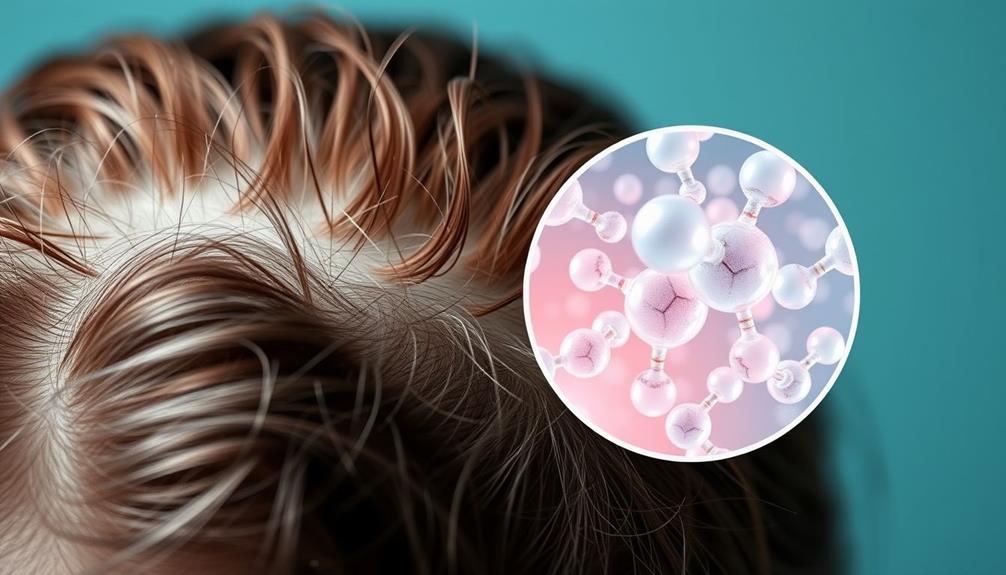
Glycolic acid works wonders for your scalp by exfoliating dead skin and reducing buildup.
This exfoliation process can enhance the effectiveness of products aimed at improving scalp health, much like the role of quorum sensing in bacteria, which coordinates behavior for peak function.
It also helps retain moisture and balances your scalp's pH levels, creating a healthier environment for hair growth.
With regular use, you'll notice improved scalp health and stronger hair.
Exfoliation and Dead Skin
Exfoliating the scalp with glycolic acid effectively removes dead skin cells by breaking down the bonds that hold them together. This mild alpha hydroxy acid (AHA) penetrates deeply due to its small molecular size, enhancing the exfoliation process.
Additionally, incorporating techniques from self-exploration through body awareness can help individuals connect with their body's responses during scalp treatments. By regularly incorporating glycolic acid into your scalp care routine, you can promote cellular turnover, leading to a fresher scalp environment.
As you clear away dead skin cells, you're also reducing product buildup and excess sebum, resulting in a cleaner, less oily scalp. This not only improves your scalp health but also creates an ideal foundation for healthier hair growth.
With improved blood circulation to hair follicles, glycolic acid contributes to scalp rejuvenation, allowing your hair to thrive. Moreover, maintaining balanced pH levels with glycolic acid can prevent fungal growth and irritation, further supporting your scalp's overall well-being.
Moisture Retention Mechanism
Regularly addressing dead skin and product buildup not only clears the scalp but also sets the stage for glycolic acid to act as a moisture magnet, enhancing hydration levels effectively.
By dissolving dead skin cells and impurities, glycolic acid allows moisture to penetrate more deeply into your scalp, promoting better hydration. This increased moisture retention is vital for maintaining scalp health, as it helps combat dryness and flakiness.
When you use glycolic acid, you're not just exfoliating; you're improving the overall environment of your scalp. This alpha hydroxy acid encourages better product absorption, allowing hydrating treatments to work to their full potential.
Additionally, it plays a role in maintaining balanced pH levels, which can prevent irritations and fungal growth that often lead to moisture loss.
The benefits of glycolic acid extend beyond just hydration. Clinically proven to maintain moisture levels in hair, it contributes to reducing breakage and enhancing overall hair resilience.
Regular treatments can restore moisture balance, promoting healthier hair growth and a vibrant scalp appearance.
Embracing glycolic acid in your hair care routine is a step toward achieving a hydrated and resilient scalp.
Ph Balance Regulation
Maintaining a balanced pH level on your scalp is fundamental for preventing irritation and promoting overall scalp health, and glycolic acid plays a key role in achieving that balance.
As a mild alpha hydroxy acid (AHA), glycolic acid effectively regulates your scalp's pH by exfoliating dead skin cells and product buildup. This process not only reduces irritation but also minimizes sensitivity on your scalp.
Glycolic acid penetrates deeply into the skin layers, stimulating collagen production while supporting skin integrity and maintaining pH balance. Its moisture-attracting properties enhance hydration, helping to prevent dryness and flakiness.
By incorporating glycolic acid into your scalp care routine, you can promote a more stable pH balance, which is essential for minimizing conditions like dandruff and seborrheic dermatitis.
Furthermore, maintaining this balance is critical for preventing fungal growth, which can lead to various scalp issues.
Regular use of glycolic acid treatments is an effective way to guarantee your scalp stays healthy, hydrated, and irritation-free, ultimately contributing to your overall hair health.
Embrace glycolic acid for a happier, healthier scalp!
Recommended Usage Guidelines
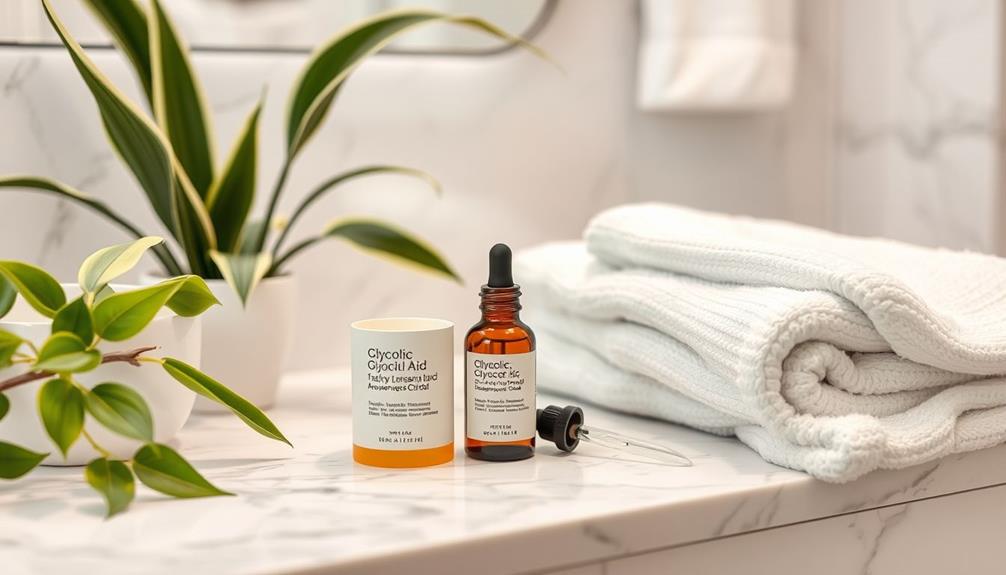
Before using glycolic acid on your scalp, it's crucial to consult a dermatologist to determine the best strength for your needs, typically between 5% and 20%, with 7% being the most common choice.
For effective scalp care, limit your usage to once or twice a week. This helps minimize the risk of irritation, especially if you have sensitive skin.
Before your first application, conduct patch testing to check for any adverse reactions. Apply a small amount of glycolic acid to an inconspicuous area and wait 24 hours. If you experience redness, swelling, or significant irritation, avoid using it on your scalp.
After applying glycolic acid, be cautious about sun exposure, as it can increase skin sensitivity. Long-term use shouldn't exceed 1-2 times a month to reduce the likelihood of irritation.
If you feel tingling or a mild burning sensation, that's normal, but stop using the product if severe irritation occurs.
Never apply glycolic acid to recently treated scalps or areas with open wounds or delicate conditions.
Following these usage guidelines guarantees you reap the benefits without compromising your scalp health.
Potential Side Effects
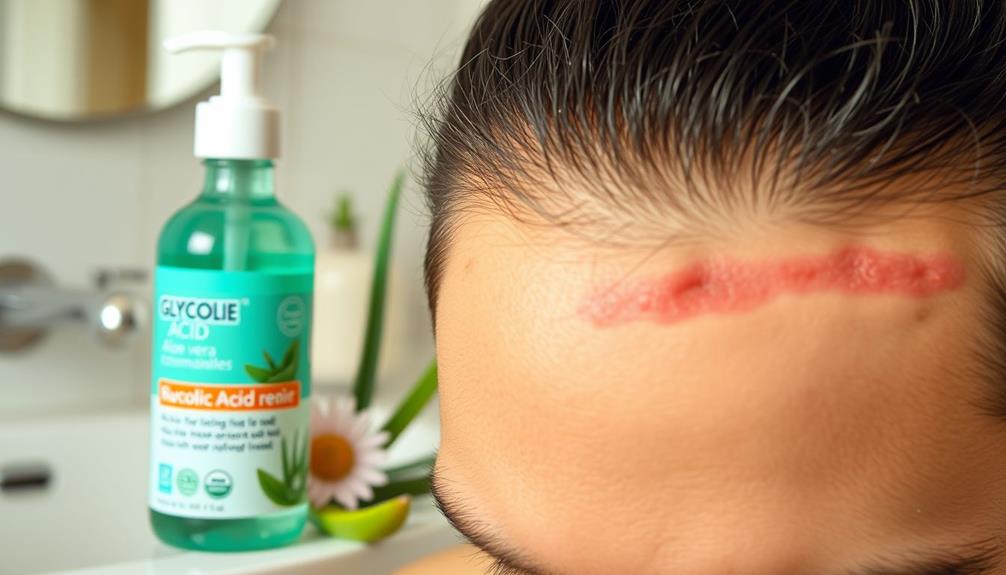
Using glycolic acid on your scalp may lead to some side effects, including mild tingling or burning sensations, especially during initial applications. This sensation can indicate sensitivity to the ingredient.
While many people tolerate glycolic acid well, overuse can cause scalp irritation, dryness, or even chemical burns, so it's essential to follow recommended usage guidelines.
If you've recently treated your scalp with methods like rebonding or straightening, or if you have open wounds, it's best to avoid glycolic acid altogether due to the risk of adverse reactions.
Before diving in, you should consult a dermatologist, especially if you have sensitive skin. They can provide personalized recommendations to guarantee your safety.
Additionally, performing patch testing is a wise step. This allows you to identify any potential sensitivity or adverse reactions before applying glycolic acid more broadly.
By being aware of these potential side effects and taking necessary precautions, you can effectively incorporate glycolic acid into your scalp care routine while minimizing risks.
Alternatives to Glycolic Acid

If glycolic acid isn't suitable for you, there are several effective alternatives that can promote scalp health and address similar concerns.
One popular option is apple cider vinegar. It helps balance your scalp's pH and has antibacterial properties that can reduce dandruff. Incorporating it into your routine can be a simple yet effective way to enhance scalp health.
Another alternative is salicylic acid, especially beneficial if you struggle with oiliness or acne-prone scalps. It works to unclog pores and can help exfoliate, removing excess buildup.
For a natural remedy, consider tea tree oil, known for its antifungal and anti-inflammatory properties. It can alleviate dandruff and soothe irritation effectively.
Additionally, regular scalp massages with natural oils like jojoba or coconut oil can enhance hydration and blood circulation, contributing positively to your scalp health without relying on chemical exfoliants.
These alternatives can provide the benefits you're looking for while avoiding potential side effects associated with glycolic acid. By exploring these options, you can find a suitable solution that meets your scalp care needs.
Expert Recommendations
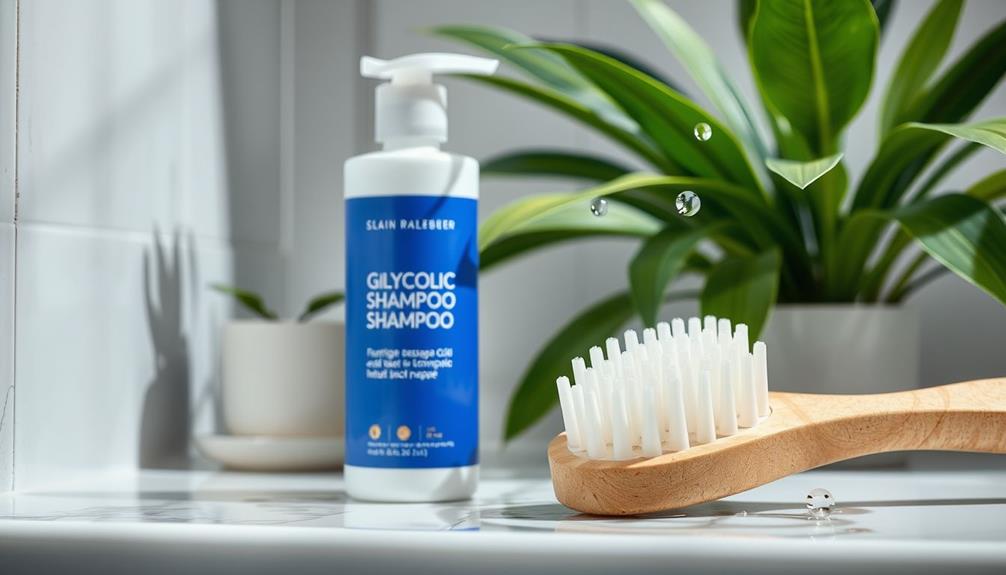
Consult a dermatologist to determine the best approach for incorporating glycolic acid into your scalp care routine. They'll help you assess your particular scalp conditions and sensitivities before starting any treatment.
Experts generally recommend using glycolic acid products at concentrations between 5% to 20%, with 7% being a common starting point for most users.
To minimize the risk of irritation, consider the following recommendations:
- Limit your use of glycolic acid to once or twice weekly.
- Always perform a patch test before applying the product broadly to guarantee you don't experience adverse reactions.
Hair Type Considerations
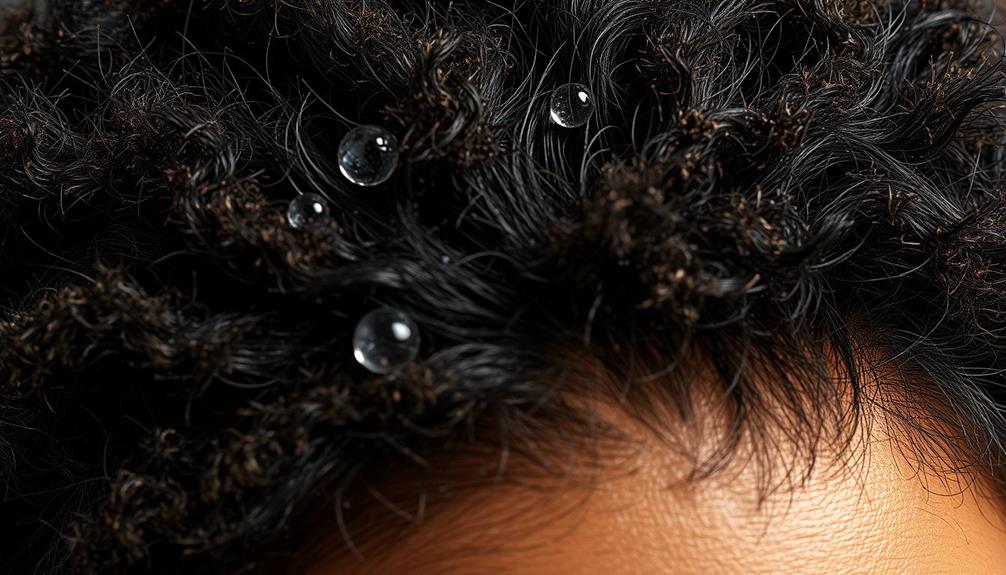
Understanding your hair type is fundamental when deciding how to incorporate glycolic acid into your scalp care routine.
If you have an oily scalp, glycolic acid's exfoliating properties can work wonders. It helps remove excess sebum and product buildup, promoting better scalp health. Using glycolic acid once or twice weekly is typically recommended for ideal results.
However, if your hair is color-treated or recently styled with chemicals like straightening or perming, you should avoid glycolic acid. It can damage your hair and exacerbate any existing issues.
For those with sensitive skin or open sores, caution is important as glycolic acid can cause irritation.
Keep in mind that long-term use may lead to hair loss, so monitoring how often you apply glycolic acid is significant. If you notice any adverse effects, consider scaling back to monthly usage.
Frequently Asked Questions
Does Glycolic Acid Help With Scalp Health?
Yes, glycolic acid helps with scalp health. It exfoliates dead skin, removes buildup, and hydrates your scalp, reducing dandruff and irritation. Regular use can promote healthier hair growth and strengthen your hair, minimizing breakage.
How Long Does It Take for Glycolic Acid to Work on the Scalp?
When you're wondering how long it takes for glycolic acid to work on your scalp, you'll notice improvements in just 3 to 4 weeks, with significant changes often visible after 1 to 2 applications each week.
Can Glycolic Acid Help Seborrheic Dermatitis?
Yes, glycolic acid can help seborrheic dermatitis. It reduces scaling and flaking by exfoliating dead skin cells, balances scalp pH, and alleviates symptoms like itching and redness, promoting overall scalp health and comfort.
Does Glycolic Acid Repair Hair?
Yes, glycolic acid can repair hair. It exfoliates the scalp, removes buildup, and maintains moisture, which helps reduce breakage. Regular use strengthens your hair, making it healthier and more resilient against damage.
Conclusion
As you explore the benefits of glycolic acid for your scalp, imagine the transformation waiting just beneath the surface.
With each application, you're not just treating your scalp; you're revealing a world of improved health and energy for your hair.
Will you take the leap and embrace this powerful ingredient?
The path to a revitalized scalp and luscious locks is within your reach, but the choice is yours.
Don't let it slip away—discover the difference today.

